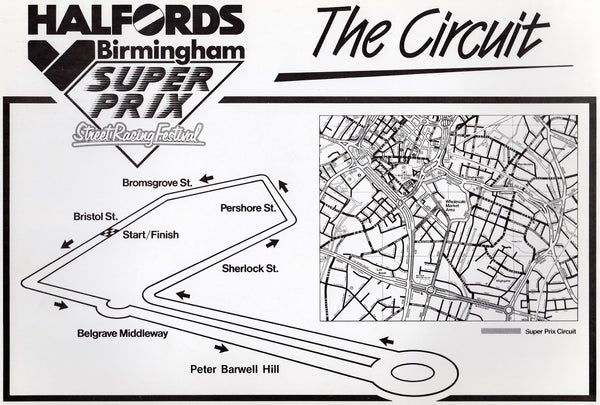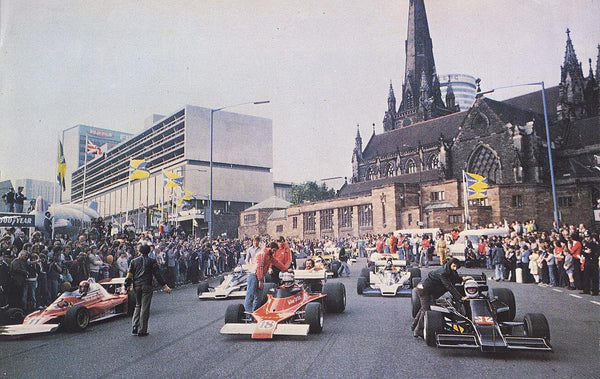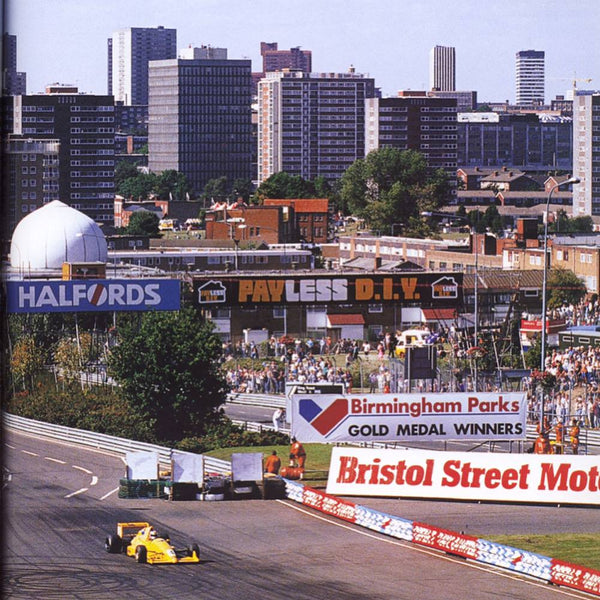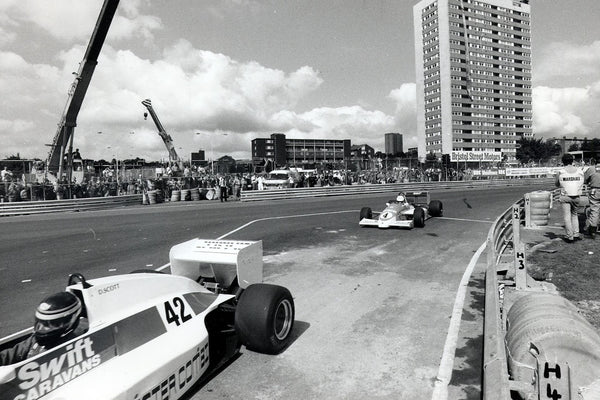Andy Smallman is a musician and motorsport fan with an industrial work ethic and unshakable pride in his hometown. Founder of the Birmingham Superprix Archive Project, we approached him last year with the hope of exploring their vaults to inform our own Superprix collection. The imagery we discovered was a treasure trove of late 80s graphics and photography, so we sat down with Andy to find out more about the races, their impact on Birmingham and the future of motorsport and creative culture in the city.
We're both too young to have our own memories of the Birmingham Superprix! Where did your interest in the races come from?
When I was growing up my family were all into motorsport, and my Dad would tell me about this race that used to happen in Birmingham city centre. This was before we had the internet, so I really had to imagine what it would have been like - there was very little footage or imagery of the Superprix in circulation when I was a kid.

So how did the Superprix Archive Project come about?
A couple of years ago I picked up a book about the Superprix and within the first few pages I was blown away by the scale of the event - it surpassed anything I ever imagined it to have been. I went online and tried to find everything that I could about the event, and found some original video footage that had been uploaded to YouTube. I had this idea of creating a short retrospective film trailer for the event - something that merged old audio with new and archive visuals... a haunting, romantic look back at what once took place on our city's streets. The aim was to introduce a whole new generation to the amazement I had discovered in this long forgotten spectacle.
Who helped you to create the initial trailer?
I knew a few filmmakers and other creatives that I thought might be interested, so I started reaching out to people with an idea of creating a short teaser that would act as an introduction to the project. I brought Kate Hook, Aaron Jones and Dom Cross on board, then we met archivist David Page, who as it turns out was one of the people behind the Superprix book that kick started my motivation for the whole project. We're a small team, and everyone brings a slightly different approach to curating the archive. My role is as a director, overseeing how we use film and images, gathering all of our resources and contacts, and trying to coordinate our promotion with other events where we might be able to cross promote.
Introductory trailer for the Birmingham Superprix Archive Project
Regarding the race itself, what do you think it was about the city that made it possible to host such a ground breaking - and potentially disruptive event?
I think the race worked here because of the city's connection to the motor industry. Although in the late 80s the city was run down, Birmingham played an important role within the motoring industry, being home to various manufacturers. The geographical location was also important; people were easily able to come in from lots of surrounding cities. The whole reason the pioneers of this event pushed for it to be held within Birmingham city centre is because they saw the potential in its history and culture linked with the motoring industry, and motorsport is seen as a testing ground for engineering... so it tied in with the innovation that was happening in the factories around the city.
How do you think the city's relationship with the motoring industry has changed since the Superprix - and could we ever see legal street racing return?
There has been a huge decline in the number of motoring related factories and jobs since those races - but the industry is still alive here. Jaguar Land Rover, with their growing interest in returning to racing, are proving that the motor industry as a whole has moved beyond just selling cars - they realise that their culture and heritage are all valuable assets that can be leveraged for tourism and brand building. And, with recent talk of Formula E looking for a new circuit, there is a lot of buzz around Birmingham about the possibility of bringing racing back to our city streets. The internet is making it possible for grass roots supporters like us to galvanise, share ideas and make a case for bringing it back. Companies like Red Bull have shown the impact that can be made by staging unique racing events, and if the city of Birmingham looked to them as an example, a return of the Superprix could be a huge success today.
Finally; the Superprix seemed to create an optimism in Birmingham - staging such a big event made people feel like it was a city that could compete on a global stage, yet it came to an abrupt end and was almost swept under the carpet by the council, as if it never happened. Now, with almost weekly think pieces in the media, the promise of HS2 and a new Combined Authority, many would have us believe we are once again on the cusp of greatness. Do you believe this - or is Birmingham perennially destined to be 'almost there'?
You can't deny that there has recently been a boom in interest in Birmingham across sectors from music and art to sport and business - people are talking about the city. But then again, we have always harboured innovation and progress - look at Heavy Metal, one of our greatest exports ever! Regardless of who’s in power or who guards the finances, there have always been people from this area who have pursued their own vision and gone on to great things. What's different now though is that it's much easier for individuals and small groups to get behind an idea or start a project of their own thanks to the internet and our ability to communicate instantly. Not only does it help people share their current projects, but it allows us to shine a light on older stories - like that of the Superprix - which should inspire new generations of creatives when they see what people from around here achieved in the past. And while council-led events like the Superprix and larger government initiatives can boost the region in certain ways, I'm much more interested in what our younger generations are pushing forward themselves, using new technologies at their disposal, inspired by creative pioneers of the past but driven by their own passions and goals.
Follow the Birmingham Superprix Archive Project on Facebook and Instagram.
Shop the Provide Superprix collection - limited quantities remaining.


